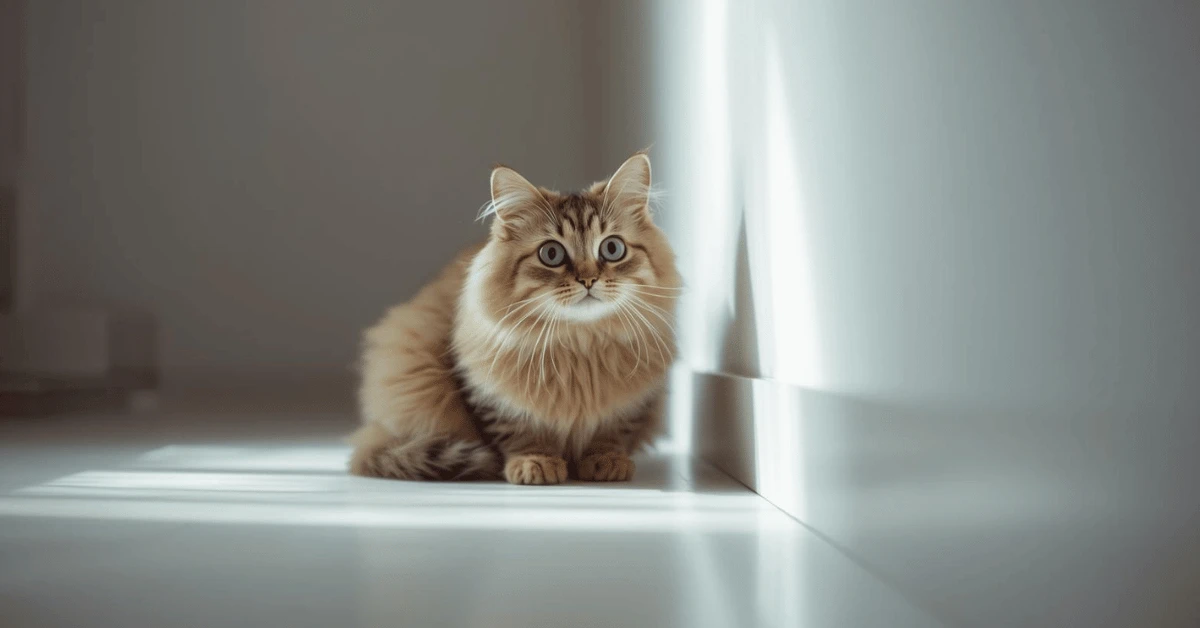Cats are fascinating creatures, often leaving us scratching our heads with their unusual habits. One of the most puzzling behaviours is when a cat suddenly locks its gaze on a blank wall, an empty hallway, or even mid-air — seemingly staring at nothing.
The truth is, there are several possible explanations for this behaviour. Cats have extraordinary senses, strong hunting instincts, and even quirky relaxation habits that can make staring appear odd to humans.
1. Heightened Senses at Work
Cats experience the world in ways far beyond our human capabilities.
Detecting Subtle Movements
What looks like a blank wall to you may actually be alive with movement your cat can detect. Cats are masters at spotting the tiniest motions — a speck of dust drifting, a small bug crawling, or even the flutter of fabric fibers.
Hearing the Unheard
Your cat’s ears are like finely tuned instruments. They can hear frequencies up to 64 kHz, far surpassing human limits. That faint scratching inside the walls, the buzz of an appliance, or a distant sound outside could easily hold your cat’s attention.
2. A Hunting Instinct in Action
Even well-fed house cats retain their wild ancestry.
Practicing Their Predator Skills
In the wild, cats rely on patience and stillness before striking prey. When your cat stares, it could be instinctively honing this ability, even if the “prey” is just a shadow or dust particle.
Waiting for the Perfect Moment
Sometimes cats freeze in a trance-like stare before launching into play or pouncing. This hyper-focus is part of their survival toolkit, carried into domestic life as quirky behaviour.
3. Curiosity About the Environment
Cats are naturally curious, and staring can be part of their investigation process.
Studying Shadows and Light
Reflections from glass, shifting sunlight, or even the flicker of a screen can mesmerize your cat. What seems ordinary to us might be endlessly entertaining to them.
Observing Tiny Details
Cats notice what we ignore. Textures, cracks, or slight movements in their environment may captivate them for long periods.
4. A Sign of Relaxation or Daydreaming
Not every stare has a deep purpose — sometimes it’s just downtime.
Entering a Restful State
Cats spend up to 16 hours a day sleeping, but even when awake, they may enter a semi-resting state. A blank stare can simply be part of this relaxation process.
Mental Processing
Some experts believe cats, like humans, process experiences when they appear “zoned out.” Your cat’s stare might be their version of daydreaming.
Related Posts
- 7 Weird Cat Behaviours You Shouldn’t Ignore
- How Long Can a Cat Go Without Eating or Drinking?
- 7 Strange Cat Senses Explained by Science
- Can Cats Eat Catnip? Benefits, Risks, and Safe Usage
- What Is Catnip? History, Science, and Why Cats Love It
5. Potential Health Concerns
While often harmless, staring at nothing can sometimes be linked to medical conditions.
Neurological or Vision Issues
Cats with vision problems may appear fixated because they’re struggling to interpret what they see. Neurological issues — such as seizures, feline cognitive dysfunction, or vestibular disease — can also cause odd staring episodes.
When to Call the Vet
If your cat’s staring is accompanied by symptoms like circling, head pressing, disorientation, or lack of coordination, it’s crucial to consult a veterinarian. The Cornell University College of Veterinary Medicine notes that subtle behavioural changes are often the first signs of illness in cats.
6. Responding to Stress or Anxiety
Emotional health can influence feline behavior.
Freezing as a Stress Response
Cats often freeze and stare when faced with stressors, such as loud noises, unfamiliar visitors, or sudden changes in the home. This can be a way of assessing threats before reacting.
A Form of Self-Soothing
By focusing on something static, cats may calm themselves in stressful situations. This can look like a blank, unblinking stare.
7. The “Sixth Sense” Factor
Cats have long been associated with mystical perception.
Sensitivity to Vibrations and Energy
Even without supernatural explanations, cats are exceptionally sensitive to vibrations, air currents, and shifts in their environment.
Folklore and Feline Mystique
Many cultures have linked cats to the unseen world. While science explains most behaviours, their unexplained stares continue to fuel their aura of mystery.
When to Worry About Cat Staring
While most staring is harmless, certain signs should prompt caution.
- Sudden increase in staring episodes
- Staring paired with unusual movements (twitching, circling, collapsing)
- Head pressing against walls or objects
- Lethargy, appetite loss, or behavior changes
If you notice any of these, schedule a veterinary exam as soon as possible.
How to Keep Your Cat Mentally Stimulated
Sometimes staring at nothing happens because your cat is bored. Providing enrichment can reduce idle behaviors and improve overall happiness.
Interactive Playtime
Use feather wands, laser toys, or chase balls to engage their hunting instincts in healthy ways.
Environmental Enrichment
Cat trees, puzzle feeders, and window perches can keep your cat’s mind and body active, reducing the likelihood of prolonged staring episodes.
Routine and Comfort
Cats thrive on routine. Maintaining a consistent schedule for feeding and play helps reduce stress-related staring.
Strengthening Your Bond Through Observation
Understanding your cat’s body language, including their staring habits, deepens your connection. Instead of dismissing it as strange, pay attention to when and why it happens. You may uncover patterns linked to environment, play, or even emotional states.
By responding to their needs — whether through enrichment, comfort, or veterinary care — you show your cat that you value their unique ways of communicating.
Conclusion
Cats staring at nothing is a behaviour that can be fascinating, funny, or sometimes concerning. Most often, it’s linked to their superior senses, instincts, or simple relaxation.

1 thought on “7 Reasons Your Cat Stares at Nothing: A Complete Guide for Pet Owners”